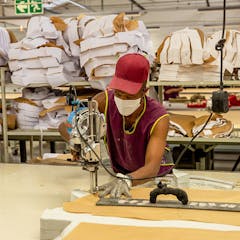
Articles on Online learning
Displaying 41 - 60 of 201 articles

Papua, one of Indonesia’s most rural provinces, struggled with online learning during the COVID-19 crisis. Interestingly, it may just be the right moment to invest in Papua’s education technology.

Research is now showing what works — and what doesn’t — for students forced online by the pandemic. Better course design should be the next step.

Community-run centres in regional and remote Australia are having positive impacts on students who were historically under-represented at university and at high risk of dropping out.

Traditional learning formats often fail marginalized students. We should be skeptical of a ‘one-size-fits-all’ or even ‘one-size-fits-most’ model.

If you think the ‘digital natives’ have better online search skills than their parents, you’d be wrong. But simply telling students what to do isn’t the best way to improve their skills.

We live in a world of spoken, visual and written communication, but the third mode continues to dominate teaching and assessment in university communication courses.

A study of Australian students affected by COVID restrictions found the more adaptable ones had more confidence about online learning and made greater progress. So how can this skill be taught?

Some promoters of educational technology see COVID-19 as a ‘tech reckoning’ for professors who refused to accept progress. But before the pandemic, many students also preferred in-person classes.

Virtual education piggybacked onto classroom learning demonstrates a lack of respect for teachers, student equity and public education.

The evidence clearly shows one-on-one tutoring improves disadvantaged students’ skills. An Australian pilot program has now shown the benefits of online tutoring that supports students in their homes.

Online learning during the pandemic gives students more autonomy. For high-achieving students, especially those in academically mixed classes, that’s an advantage, whereas others might struggle.

Demand for professional development has grown but the pandemic has forced it online. Decades of evidence from online education tells us how to ensure professional development remains effective.

People living outside our big cities face many obstacles to going to university, but the innovations during lockdowns have opened a door to permanently improving their access and experience of study.

As the saying goes, you can lead a horse to water, but you can’t make it drink. Just because students are given the freedom to learn, it does not mean they will.

Universities can best prepare students by teaching them in ways that reflect the realities of how professionals and the wider community now operate.

Students with disability continue to face dire exclusion in education and there is an urgent need to provide inclusive education for them.

While the loss of contact learning time can be quantified, it’s more difficult to quantify the effect of school closures on learning outcomes.

The pandemic has heightened existing weaknesses in South Africa’s skills training regime.

We ought to worry that the pandemic has made it even easier to reduce teaching to disseminating knowledge.

The pandemic education shock has raised five critical issues that demonstrate how student learning and achievement and social well-being are far from mutually exclusive.
